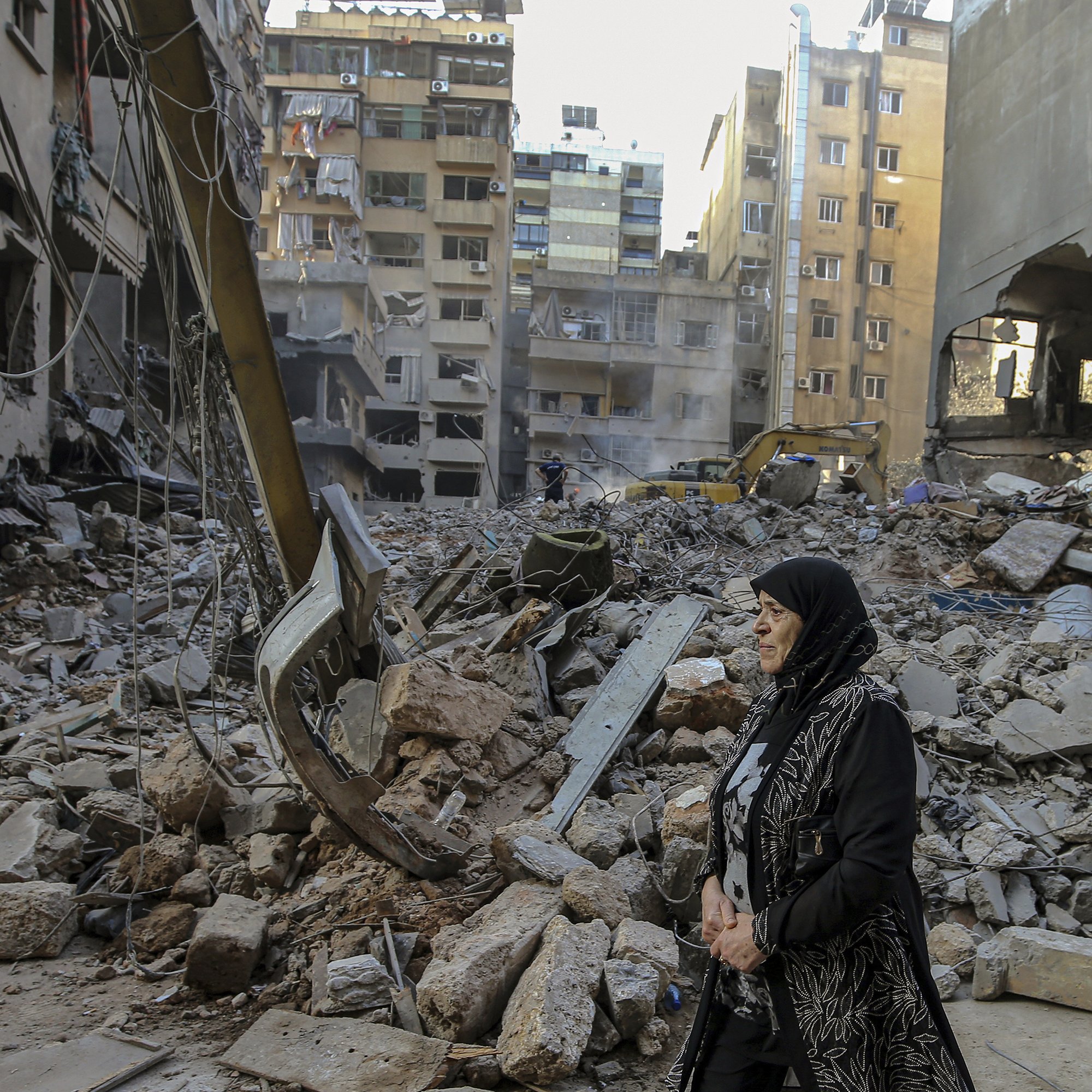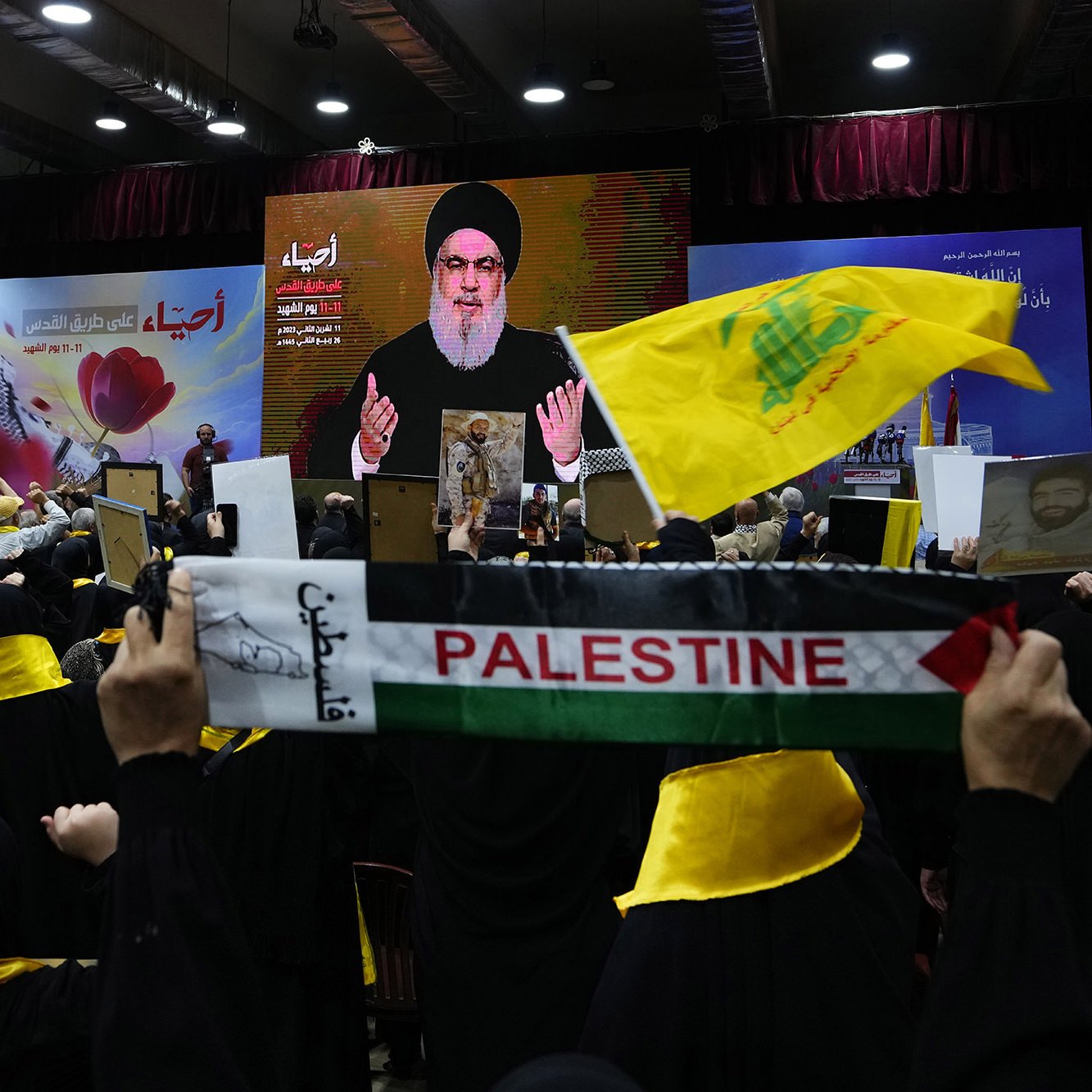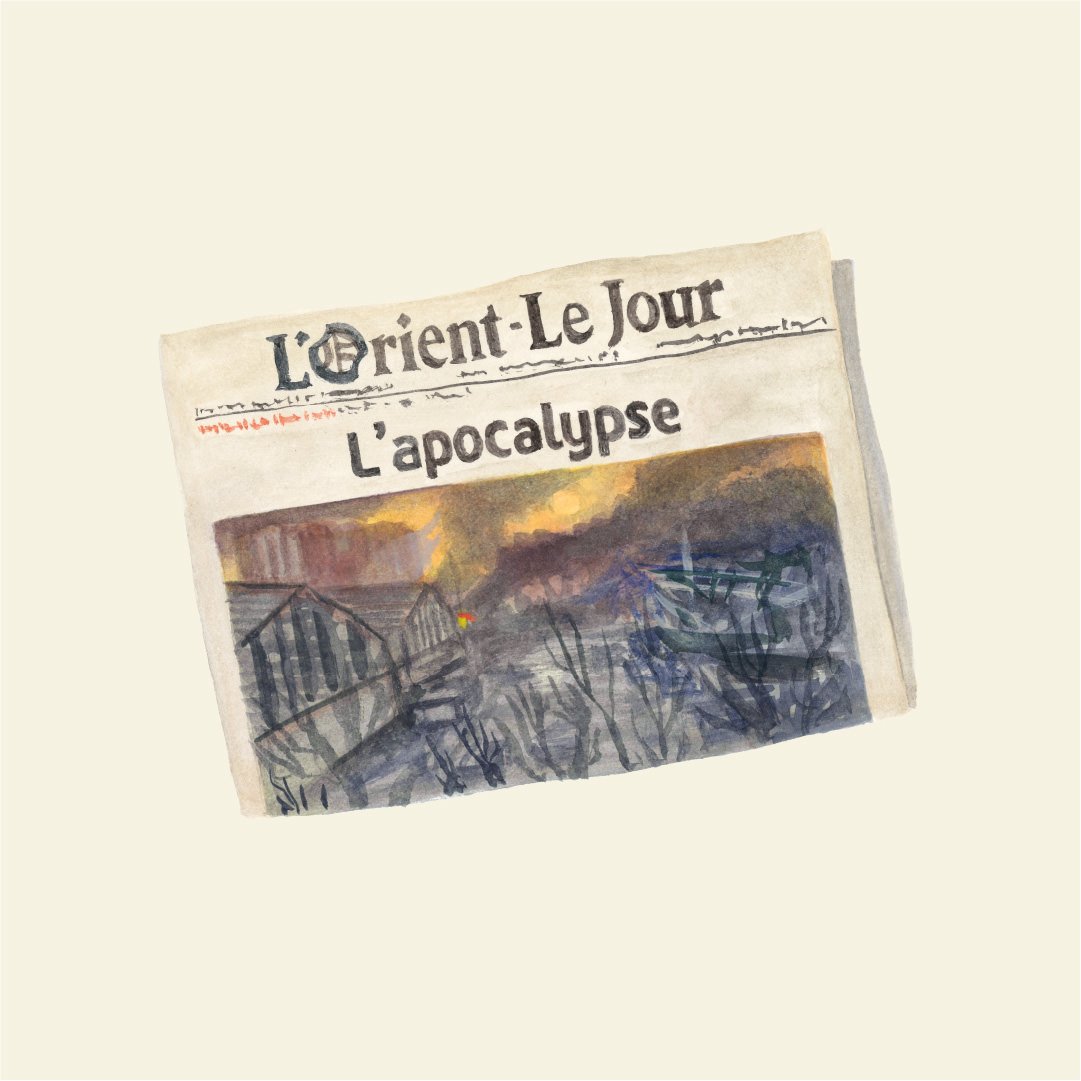“They Are Liars”
Israel’s attacks in Beirut, and American complicity in them, has confirmed for many Lebanese how little they matter to the United States.
OCTOBER 17, 2024
PHOTO: A woman reacts as she walks in front of flattened buildings that were targeted by Israeli air raids in central Beirut. October 11, 2024. By Marwan Naamani/picture-alliance/dpa/AP Images.
On September 29, Houssein Al Kadi, a soldier in the Lebanese army, left his brother’s house in Zboud, in northeastern Lebanon, at 8:15 a.m. to report to his military barracks three hours away.
A few days earlier, on September 23, Israel had intensified its attacks on Lebanon, bombing heavily in the south and northeast, and killing more than 550 people in 24 hours. Al Kadi and his fiancée had sought refuge at his brother’s home. They would be safer there, he thought.
The ride to his barracks was long, and his family worried about him. His fiancée messaged repeatedly, checking on his status. Shortly after 11 a.m., he sent a message reassuring her that he’d arrived safely. “Thank God,” she wrote back.
There is widespread agreement that Israel would not be waging war on Lebanon without financial support from the U.S. and its unflinching defense of Israel in the United Nations Security Council.
Forty minutes later, Al Kadi’s phone started to ring incessantly, neighbor after neighbor calling to ask if he was still at home and checking he was safe. There had been a huge explosion in the town — an Israeli airstrike — the neighbors said.
He called his fiancée. There was no reply. His sisters didn’t pick up the phone either. He called his father, who answered. “May God grant you patience,” he said. “They are gone.”
Al Kadi lost 17 family members in the strike, including his fiancée. “My brother’s children are as young as two years old and they were martyred,” he told me over the phone, “into pieces of pieces.”
Since the Israel-Hamas war began a year ago, more than 2,300 people have been killed by Israeli attacks on Lebanon, according to Lebanon’s Health Ministry. The day after Hamas’s attacks on Israel on October 7, 2023, the Iran-backed Lebanese military group Hezbollah fired rockets at an Israeli-occupied area of land on the Lebanese-Syria border that Lebanon and Syria both claim is Lebanese. Hezbollah said they would continue firing rockets until there was a ceasefire in Gaza. This attack began an 11-month-long exchange of cross-border attacks between Hezbollah and Israel, displacing tens of thousands on both sides of the Israel-Lebanon border. Between October 8, 2023 and September 20, 2024, Israel launched more than four times as many attacks on Lebanon as Hezbollah and their allies did on Israeli targets.
And then came the Israeli escalation. At least 1,500 of the 2,300 deaths in Lebanon have occurred since September 23, when Israel’s military, ostensibly targeting Hezbollah, and fueled by American military aid, intensified its attacks across the country, bringing about the deadliest day of conflict since Lebanon’s civil war, which lasted from 1975 to 1990. Three days later, Israel said it had secured another $8.7 billion in military aid from the U.S.
On September 27, Israel’s Prime Minister Benjamin Netanyahu allegedly gave the order to assassinate Hezbollah’s leader Hassan Nasrallah. Lebanon’s foreign minister said Netanyahu delivered the order after Nasrallah had agreed just days before to a temporary ceasefire deal brokered by the U.S. and other countries at the UN General Assembly.
Al Kadi lost 17 family members in the strike, including his fiancée. “My brother’s children are as young as two years old and they were martyred,” he told me over the phone, “into pieces of pieces.”
The evening of Nasrallah’s death, Israel’s Arabic-language military spokesperson began sending evacuation notices to large swathes of Beirut’s southern suburbs, known locally as Dahiyeh. Around 700,000 people are estimated to live in the densely populated area. Many of them had an hour to gather a few things and flee to family in other areas. Those who didn’t know where to go ended up in parks or by the sea, sleeping on sidewalks or the sand.
By early October, the number of Israeli troops in Lebanon was estimated to be around 15,000. Footage from southern Lebanon is reminiscent of some of the worst destruction in Gaza, where more than 41,000 Palestinians have been killed in the past year, according to the Palestinian Health Ministry. An estimated 1.2 million people in Lebanon have been displaced.
To the horror of many in Lebanon, CNN reported in early October that the U.S. is not pushing to revive the ceasefire deal between Israel and Hezbollah, despite fears that what Israel claims is a limited operation could turn into a longer conflict. Earlier this week, a U.S. State Department spokesperson said the U.S. has “made clear to Israel” that it opposes the country’s recent attacks on Beirut. The spokesperson would not say whether the U.S. plans to impose any consequences on Israel if the attacks continue. According to the CNN report, U.S. officials say they have limited influence on what Israel does in the region.
Many in Lebanon don’t see it that way. The Lebanese people have a wide range of views on Hezbollah, which, in addition to being a militant group, has ministers and members of parliament and provides social services to its adherents. There’s been both fervent support and strong criticism of Hezbollah’s decision to engage militarily with Israel. But there is widespread agreement that Israel would not be waging war on Lebanon without financial support from the U.S. and its unflinching defense of Israel in the United Nations Security Council. “If [the Americans] wanted this to stop, they would have stopped it on the first try,” Al Kadi told me. “I mean, they are the ones supporting it. If [the Israelis] are getting that kind of support, they will keep doing it.”
Beirut is my father’s hometown. It’s where he was raised, and where he was wounded by an Israeli white phosphorus shell while working as a photojournalist during Israel’s siege of West Beirut in 1982. He left for good in 1984 and I was born in Brussels; I didn’t visit Lebanon until 2005, when I was 18. Five years later, I moved to Beirut and have lived here on and off since. The city is where I met my wife and, since my father passed away in 2022, where I feel his presence most strongly.
Over the past year, I’ve been reporting on the war’s impact on Lebanon. Until September, however, I felt that impact at a remove: Israel’s attacks were largely confined to the country’s south and pockets in the east. Since September 23, that remove is gone. Hamra, the neighborhood in Beirut where I live and where my father grew up, has nearly doubled in inhabitants due to the newly displaced. This neighborhood hasn’t been hit by an Israeli attack. At least, not yet.
Now, each night, local news livestreams bombings across the country, as Israeli airstrikes devastate entire blocks of homes, shops and offices. The explosions are spectacular, bursts of red and orange making it look as though the violence of the impact is pulling the sun back up from its slumber.
Mona Harb, a professor of urban studies and politics at the American University of Beirut, says the attacks on the Dahiyeh suburbs amount to urbicide — the deliberate destruction of a city and its identity, of the places where people once did all of life’s beautiful and mundane things.
I have lost track of the number of friends, or friends’ families, who are displaced. Diana, my wife’s friend from college, sends me videos of the destruction to her uncle’s home in the Beirut suburbs. Zeinab, a friend of a friend, tells me her room in Hadath, in the southern part of the city, “has a balcony now,” a shattering example of Lebanese dark humor.
As I watch the bombs, I think of the drinks vendor who sold freshly made pomegranate juice on a hot summer day and the soccer pitches where I used to play when I first moved to Beirut.
I think of the Roman ruins in Baalbek, in Lebanon’s east. My father took me there on my first trip to Lebanon. Now, my phone shows me images of smoke rising from behind the ruins.
I think of going last spring to Bourj el-Barajneh, a Palestinian refugee camp established just south of Beirut, to visit my friend Ali, who lived there, and take part in an Iftar with his family during Ramadan. He’s now sleeping at a friend’s home in Beirut, and his parents are in a shelter elsewhere in the city. Ali told me that the night Nasrallah was assassinated by 2,000-pound bunker-busting bombs, the entire camp shook as if there had been a massive earthquake. Parts of the camp have been destroyed in the subsequent nights of bombing, though Ali’s house is still standing.
I have lost track of the number of friends, or friends’ families, who are displaced. Diana, my wife’s friend from college, sends me videos of the destruction to her uncle’s home in the Beirut suburbs. Zeinab, a friend of a friend, tells me her room in Hadath, in the southern part of the city, “has a balcony now,” a shattering example of Lebanese dark humor.
Fatima Kandil is the aunt of a friend’s wife. She fled her home the day Israel started bombing Lebanon and is living with her cousin. The American government, she said, sardonically, is clearly “very concerned with peace in the Middle East” as it supports “the state entity that hits us with weapons including families and kids.”
“They are liars,” she said.
✺
Many in Lebanon see little hope for change under the next U.S. president, whether it is Kamala Harris or Donald Trump.
This is a case, then, of the lesser evil. But one fact remains and that’s if you're dead, it doesn't matter which leader 6,000 miles away never knew your name, never knew your story.
American policy, as far as Lebanon or the Middle East is concerned, has been consistent for decades, my friend, the Lebanese American historian and writer Zeead Yaghi, told me in early October. We were sitting the back patio of his home in a neighborhood of Beirut that had not yet received an evacuation order. Under Biden, Trump, Obama, Bush Jr., Clinton, Bush Sr., Reagan, and on, he said, American foreign policy has safeguarded Israeli supremacy while downplaying Arab agency and democratic ambitions. The U.S. has repeatedly intervened to suppress the latter if it endangers the former, he told me. To many in Lebanon, Harris is simply someone who will continue Biden’s disastrous politics.
Even so, there are those who believe she might be somewhat sympathetic to voices that call for placing conditions on military aid to Israel. Elia Ayoub, a Lebanese-Palestinian writer, researcher and podcaster, who lives in the United Kingdom, told me he thought progressive activists have a greater chance of impacting Harris’s policies and cabinet choices than Trump’s. The Republican, he said, would represent a “dead end.” Those who vote for him have values that are “drastically opposed to anything I consider good,” he told me.
This is a case, then, of the lesser evil. But one fact remains and that’s if you're dead, it doesn't matter which leader 6,000 miles away never knew your name, never knew your story. As the Palestinian writer Mourid Barghouti once said: “A killer can strangle you with a silk scarf, or can smash your head in with an ax; in both cases you are dead.”
For many here, it’s an apocalypse. Yet few are surprised by the level of destruction. Domestically, these latest attacks, and the U.S.’s complicity in them, have confirmed a long-held suspicion — something that Syrians, Iraqis, Palestinians and millions of others in the global south already know: The concepts the U.S. champions, concepts like human rights, equality and justice, do not apply to people here.
In three weeks, Americans will pick their next president. It’s hard to imagine what Lebanon might look like by then, or to predict the ways that having so many displaced people in the country might exacerbate its pre-existing problems. As far as American policy toward Lebanon is concerned, few believe it could be worse than it is now. Certainly no Lebanese is expecting that an American president will save Lebanon’s displaced, its dead or its grieving.



